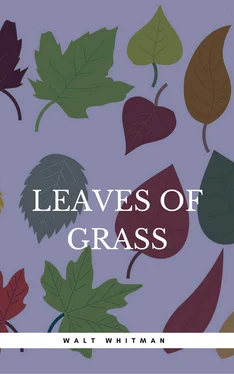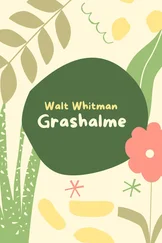Walt Whitman - Leaves of Grass
Здесь есть возможность читать онлайн «Walt Whitman - Leaves of Grass» — ознакомительный отрывок электронной книги совершенно бесплатно, а после прочтения отрывка купить полную версию. В некоторых случаях можно слушать аудио, скачать через торрент в формате fb2 и присутствует краткое содержание. ISBN: , Жанр: Языкознание, Критика, на английском языке. Описание произведения, (предисловие) а так же отзывы посетителей доступны на портале библиотеки ЛибКат.
- Название:Leaves of Grass
- Автор:
- Жанр:
- Год:неизвестен
- ISBN:9782377930524
- Рейтинг книги:4 / 5. Голосов: 1
-
Избранное:Добавить в избранное
- Отзывы:
-
Ваша оценка:
- 80
- 1
- 2
- 3
- 4
- 5
Leaves of Grass: краткое содержание, описание и аннотация
Предлагаем к чтению аннотацию, описание, краткое содержание или предисловие (зависит от того, что написал сам автор книги «Leaves of Grass»). Если вы не нашли необходимую информацию о книге — напишите в комментариях, мы постараемся отыскать её.
Leaves of Grass — читать онлайн ознакомительный отрывок
Ниже представлен текст книги, разбитый по страницам. Система сохранения места последней прочитанной страницы, позволяет с удобством читать онлайн бесплатно книгу «Leaves of Grass», без необходимости каждый раз заново искать на чём Вы остановились. Поставьте закладку, и сможете в любой момент перейти на страницу, на которой закончили чтение.
Интервал:
Закладка:
I chant a new chant of dilation or pride,
We have had ducking and deprecating about enough,
I show that size is only development.
It is indeed a strange voice! Critics and lovers and readers of poetry as hitherto written, may well be excused the chilly and unpleasant shudders which will assuredly run through them, to their very blood and bones, when they first read Walt Whitman’s poems. If this is poetry, where must its foregoers stand! And what is at once to become of the ranks of rhymsters, melancholy and swallow-tailed, and of all the confectioners and upholsterers of verse, if the tan-faced man here advancing and claiming to speak for America and the nineteenth hundred of the Christian list of years, typifies indeed the natural and proper bard?
The theory and practice of poets have hitherto been to select certain ideas or events or personages, and then describe them in the best manner they could, always with as much ornament as the case allowed. Such are not the theory and practice of the new poet. He never presents for perusal a poem ready-made on the old models, and ending when you come to the end of it; but every sentence and every passage tells of an interior not always seen, and exudes an impalpable something which sticks to him that reads, and pervades and provokes him to tread the half-invisible road where the poet, like an apparition, is striding fearlessly before. If Walt Whitman’s premises are true, then there is a subtler range of poetry than that of the grandeur and life of events, as in Homer, or of characters, as in Shakspeare—poetry to which all other writing is subservient, and which confronts the very meanings of the works of nature and competes with them. It is the direct bringing of occurrences and persons and things to bear on the listener or beholder, to re-appear through him or her; and it offers the best way of making them a part of him and her as the right aim of the greatest poet.
Of the spirit of life in visible forms—of the spirit of the seed growing out of the ground—of the spirit of the resistless motion of the globe passing unsuspected but quick as lightning along its orbit—of them is the spirit of this man’s poetry. Like them it eludes and mocks criticism, and appears unerringly in results. Things, facts, events, persons, days, ages, qualities, tumble pell-mell, exhaustless and copious, with what appear to be the same disregard of parts and the same absence of special purpose, as in nature. But the voice of the few rare and controlling critics, and the voice of more than one generation of men or two generations of men, must speak for the inexpressible purposes of nature, and for this haughtiest of writers that has ever yet written and printed a book. His is to prove either the most lamentable of failures or the most glorious of triumphs, in the known history of literature. And after all we have written we confess our brain-felt and heart-felt inability to decide which we think it is likely to be.
From the Critic. (London, England.)
LEAVES OF GRASS. New York, 1855. London: Horsell.
We had ceased, we imagined to be surprised at anything that America could produce. We had become stoically indifferent to her Woolly Horses, her Mermaids, her Sea Serpents, her Barnums, and her Fanny Ferns; but the last monstrous importation from Brooklyn, New York, has scattered our indifference to the winds. Here is a thin quarto volume without an author’s name on the title-page; but to atone for which we have a portrait engraved on steel of the notorious individual who is the poet presumptive. This portrait expresses all the features of the hard democrat, and none of the flexile delicacy of the civilized poet. The damaged hat, the rough beard, the naked throat, the shirt exposed to the waist, are each and all presented to show that the man to whom these articles belong scorns the delicate arts of civilization. The man is the true impersonation of his book—rough, uncouth, vulgar. It was by the merest accident that we discovered the name of this erratic and newest wonder; but at page 29 we find that he is—
Walt Whitman, an American, one of the roughs, a kosmos,
Disorderly, fleshly, and sensual.
The words “an American” are a surplusage, “one of the roughs” too painfully apparent; but what is intended to be conveyed by “a kosmos” we cannot tell, unless it means a man who thinks that the fine essence of poetry consists in writing a book which an American reviewer is compelled to declare is “not to be read aloud to a mixed audience.” We should have passed over this book, “ Leaves of Grass ,” with indignant contempt, had not some few Transatlantic critics attempted to “fix” this Walt Whitman as the poet who shall give a new and independent literature to America—who shall form a race of poets as Banquo’s issue formed a line of kings. Is it possible that the most prudish nation in the world will adopt a poet whose indecencies stink in the nostrils? We hope not; and yet there is a probability, and we will show why, that this Walt Whitman will not meet with the stern rebuke which he so richly deserves. America has felt, oftener perhaps than we have declared, that she has no national poet—that each one of her children of song has relied too much on European inspiration, and clung too fervently to the old conventionalities. It is therefore not unlikely that she may believe in the dawn of a thoroughly original literature, now there has arisen a man who scorns the Hellenic deities, who has no belief in, perhaps because he has no knowledge of, Homer and Shakspeare; who relies on his own rugged nature, and trusts to his own rugged language, being himself what he shows in his poems. Once transfix him as the genesis of a new era, and the manner of the man may be forgiven or forgotten. But what claim has this Walt Whitman to be thus considered, or to be considered a poet at all? We grant freely enough that he has a strong relish for nature and freedom, just as an animal has; may, further, that his crude mind is capable of appreciating some of nature’s beauties; but it by no means follows that, because nature is excellent, therefore art is contemptible. Walt Whitman is as unacquainted with art, as a hog is with mathematics. His poems—we must call them so for convenience—twelve in number, are innocent of rhythm. and resemble nothing so much as the war-cry of the Red Indians. Indeed, Walt Whitman has had near and ample opportunities of studying the vociferations of a few amiable savages. Or rather, perhaps, this Walt Whitman reminds us of Caliban flinging down his logs, and setting himself to write a poem. In fact, Caliban, and not Walt Whitman, might have written this:
I too am not a bit tamed—I too am untranslatable,
I sound my barbaric yawp over the roofs of the world.
Is this man with the “barbaric yawp” to push Longfellow into the shade, and he meanwhile to stand and “make mouths” at the sun? The chance of this might be formidable were it not ridiculous. That object or that act which most develops the ridiculous element carries in its bosom the seeds of decay, and is wholly powerless to trample out of God’s universe one spark of the beautiful. We do not, then, fear this Walt Whitman, who gives us slang in the place of melody, and rowdyism in the place of regularity. The depth of his indecencies will be the grave of his fame, or ought to be if all proper feeling is not extinct. The very nature of this man’s compositions excludes us from proving by extracts the truth of our remarks; but we, who are not prudish, emphatically declare that the man who wrote page 79 of the “ Leaves of Grass ” deserves nothing so richly as the public executioner’s whip. Walt Whitman libels the highest type of humanity, and calls his free speech the true utterance of a man: we, who may have been misdirected by civilization, call it the expression of a beast .
Читать дальшеИнтервал:
Закладка:
Похожие книги на «Leaves of Grass»
Представляем Вашему вниманию похожие книги на «Leaves of Grass» списком для выбора. Мы отобрали схожую по названию и смыслу литературу в надежде предоставить читателям больше вариантов отыскать новые, интересные, ещё непрочитанные произведения.
Обсуждение, отзывы о книге «Leaves of Grass» и просто собственные мнения читателей. Оставьте ваши комментарии, напишите, что Вы думаете о произведении, его смысле или главных героях. Укажите что конкретно понравилось, а что нет, и почему Вы так считаете.












